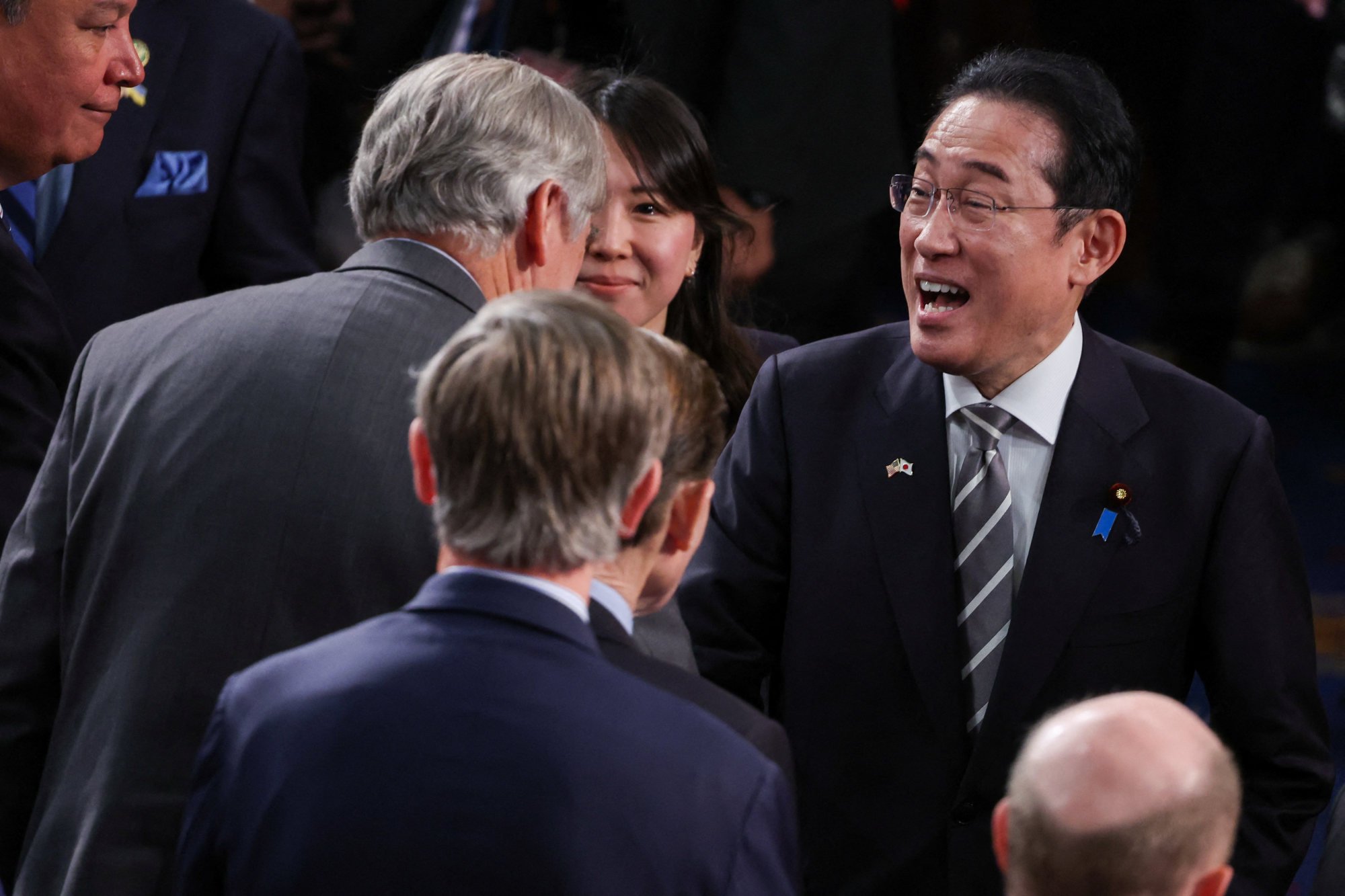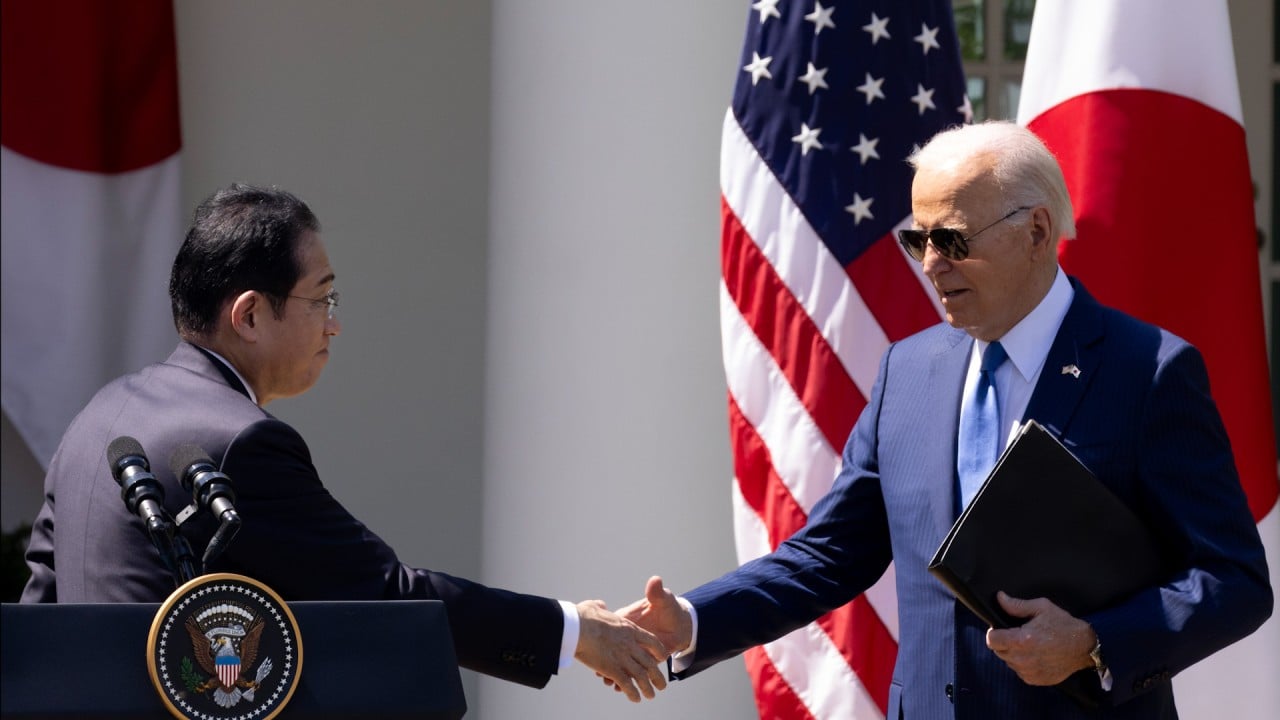
Japanese PM Kishida supports ‘indispensable’ global role of US, citing threat by China
- ‘China’s current external stance and military actions present … the greatest strategic challenge,’ Prime Minister Fumio Kishida tells joint session of Congress
- Japan was coordinating with the US, he said, strengthening its military, contributing US$12 billion to Ukraine, and developing ties with traditional antagonist South Korea
Japanese Prime Minister Fumio Kishida gave a full-throated defence of the United States’ international role as guardian of democracy on Thursday to a rare joint session of Congress, citing the enormous challenge that China and other authoritarian states represent to the global order.
The 35-minute speech, following a bilateral summit with US President Joe Biden and a state dinner at the White House on Wednesday, covered a broad range of issues in sweeping language, ranging from authoritarian governance and rule of law to digital surveillance, nuclear non-proliferation and debt-trap diplomacy.
“Close coordination between Japan and the US is required more than ever to ensure that deterrence that our alliance provides remains credible and resilient,” Kishida said, speaking in English.
“China’s current external stance and military actions present the unprecedented and the greatest strategic challenge, not only to the peace and security of Japan, but to the peace and stability of the international community at large.”
Beyond laying out the case for preserving and defending the post-World War II global order, Kishida backed Biden’s agenda as he faces domestic political opposition, including continuation of funding for Ukraine’s military against Russia’s invasion; the importance of bipartisanship; and the need to maintain global engagement at a time of instability.
“The Ukraine of today may be the East Asia of tomorrow,” he said, his speech interrupted repeatedly by applause and standing ovations.
“The leadership of the United States is indispensable. Without US support, how long before the hopes of Ukraine would collapse under the onslaught from Moscow?”
Global leadership was tiring, Kishida said, and had required significant sacrifice in US blood and treasure, noting that many Americans were battling self-doubt and turning inward. But, he added, the fight was essential and Japan could share some of the load.
Biden, Kishida, Marcos meet to show support amid China incidents: US officials
He ticked off several ways Japan was stepping up, including: a pledge to double its defence spending by 2027; a contribution of US$12 billion in aid to Ukraine, channelled through Nato; imposing sanctions on Russia; a new counterstrike capability and improved cybersecurity; and developing closer ties with traditional antagonist South Korea.
Kishida’s speech comes as the US implicitly recognises it cannot hope to counter a more economically and militarily muscular China alone even as it juggles the Ukraine and Gaza crises.
The democratic nations of the world must have all hands on deck
“Japan is already standing shoulder to shoulder with the United States. You are not alone. We are with you,” Kishida said. “We are on task and we are ready to do what is necessary. The democratic nations of the world must have all hands on deck.”
Kishida’s speech was crafted with a keen understanding of American retail politics, in contrast to many presentations in Japan’s more formal culture.

His entrance into the House of Representatives chamber, packed with lawmakers, reporters and members of his entourage, was marked by extensive clapping and handshakes.
“I never get such nice applause from the Japanese Diet,” he quipped, referring to his nation’s parliament.
Kishida followed this up by recounting his three years as an elementary school student in New York City, how he rooted for local baseball teams and watched his businessman father take the subway to work.
The message seemed well received by members of both parties, in a Congress marked by deep divisions and extreme partisanship.
Beijing accuses US and Japan of ‘smears’ over Taiwan and South China Sea
“With China aggressively encroaching on Taiwan, the relationship with Japan is more important than ever,” Representative Mark Alford, Republican of Missouri, posted on X, formerly known as Twitter, as the crowd broke up.
“We must continue to work with our friends to ensure the safety of the Indo-Pacific.”
Added Senator Michael Bennet, Democrat of Colorado: “The US-Japan alliance is the strongest it’s ever been, and we will work to make it even stronger as Japan modernises its security capabilities to address today’s shared challenges.”
After the speech, Kishida was hosted at a luncheon by US Vice-President Kamala Harris and Secretary of State Antony Blinken, with several ambassadors, US lawmakers and members of the prime minister’s cabinet in attendance.



